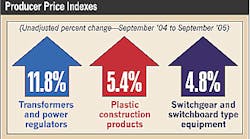When prices of construction materials spike, are specialty contractors entitled to a price adjustment to fixed-price contracts? According to the American Subcontractors Association (ASA) white paper, “Force Majeure,” the answer is no. Judges rarely rule in favor of an “impracticability” or unforeseeable event that prevents the contractor from performing work at the agreed-upon price. Instead, the judge will most likely see the price spike as a risk inherent to the construction business. Therefore, the ASA advises specialty contractors to negotiate a force majeure clause in their contracts, giving them more rights than the legal doctrine of impracticability. ASA advises contractors to keep the following guidelines in mind when negotiating a force majeure clause:
Be specific. The clause should contain language to explicitly rebut the legal argument that price adjustments can only be made when work is “impracticable.”
Use measurable terms. The clause should be worded in a way that uses specific measurable conditions for an adjustment — such as “a material price increase of 20%.”
Be original. Most industry model documents for fixed-price contracts don't give subcontractors the right to equitable price adjustments. Modify standard documents to fit your specific needs.
Don't limit yourself. Many clauses limit the specialty contractor's adjustment to an extension of time but don't mention or deny price adjustments.



